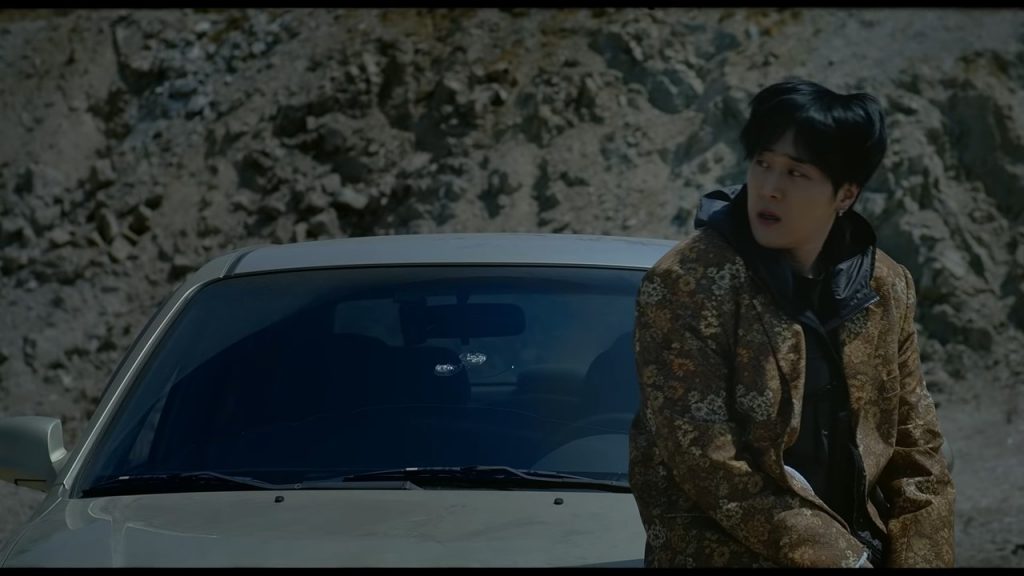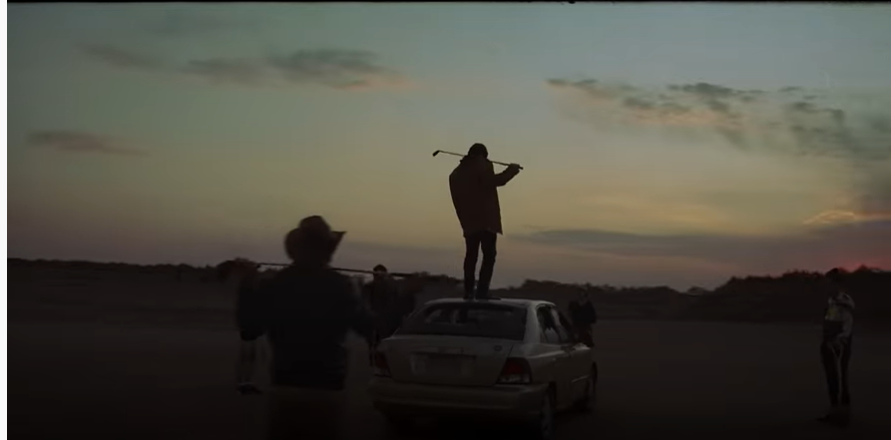
In his new single “PACKITUP!”, pH-1 calls for fake artists to “pack it up” and get out of the music business. His normally calm demeanor is cast aside in the music video to reveal an artist who fights for what he believes in, sometimes to the harm of his own reputation. In an in-depth interview with HiphopKR in 2018, pH-1 talks about the dissonance artists in South Korea face in staying true to their hip hop image, especially in a society that expects artists to be polite and respectful offstage. As a Korean-American artist that often considers himself more American than Korean, pH-1 knows first-hand what discovering oneself and building an authentic public image can entail.
In his MV for “PACKITUP!” pH-1 calls for artists that create music for clout and fame to pack it up and leave music altogether. The MV starts with pH-1 in a car driving seemingly into the middle of an uninhabited nowhere, before putting a body in the back of the car and driving elsewhere to destroy it with a borrowed golf club. The deliberately violent act is striking, especially when considering his humble, Christian upbringing. He himself says he mostly stays away from drug and sexual depictions in his music in order to convey clean, more fully artistic messages.
It is likely that this imagery could be a personification of the typical hoodlum behavior that rappers often employ to authenticate themselves in their hip hop image. The use of a golf club is especially significant and sports dual meanings. In addition to it often being regarded as a sport of privilege for the wealthy, it also serves as a metaphor for how artists play the game. By playing this game to get ahead, they not only taint the industry with a lack of authenticity, but actively harm the genre as well as themselves (or their own car as it is personified in the video).
On the flip side, with orange as his signature color since Show Me the Money in 2018, this blue-tinged track could be a reflection of a younger pH-1 who had struggled with his own identity and creative voice. Regardless, such imagery establishes a clear juxtaposition to pH-1’s calm demeanor in his daily life. This makes the use of such props and colours even more impactful, even without the person climbing out of the trunk of his car at the end of the video. Is pH-1 calling attention to this archetypal behavior or perhaps reclaiming it in his own authenticity?

The music overall is fairly minimalistic and heavily influenced by old-school hip hop beats. There seems to be three basic elements overall: low, grounded bass beats that mostly stay between two different notes, the offbeat pre-chorus, and the ornamentations that create seamless transitions between the different sections. This musical texture creates space for the intense bars that pH-1 spits in the lyrics. When listening closer, the sound samples that make up most of the transitions are old-school record scratches as well as new age audio samples, creating a link between these older, authentic sounds while problematizing contemporary issues. While overall minimalist, the structure and texture of the track itself are incredibly effective when paired with the seriousness of the lyrics.
The lyrics themselves are the stars here though it seems. The entirety of the song is only around two minutes, but that is all the time that pH-1 needs to make some very serious arguments. He asserts that while his music-making has never been about hitting the charts, others have focused on clout and fame, “making flops” that are “disrespectful to the listeners.” He drives this home further with “Music doesn’t matter if you got a good image, right?”
“Music doesn’t matter if you
Got a good image and reputation, right?
It’s okay if your album trash, long as you got hot features, right?
You ain’t got a gun
Smoking bongs just to fit in
Know some real trappers out there.”
pH-1 does not stop there. The following verse attacks critics in the industry and “bots running numbers.” This is especially relevant following recent chart manipulation controversies and a renewed speculation on the accuracy of music chart standings in general. Following assertions from Park Kyung of Block B, BTS’s Jin during the Mnet Music Awards, and the recent Produce101 scandal, “sajaegi” as it is also referred, has been a hot topic among K-pop, K-indie, and K-hiphop artists alike.
While this phenomenon has been a convoluted web of rumor, speculation, and naysaying, sajaegi is becoming increasingly relevant, calling for some companies to even begin asking the Ministry of Culture to investigate the matter. This is a claim that remains relatively unresolved or validated, but with more artists highlighting it like pH-1, pressure is mounting as the Korean music scene becomes increasingly global and widespread.
In response to these “bots running numbers” and “fakes”, pH-1 claims he won’t give up the fight waving “no white flag.” One of the last images in the video that is shown in this verse is the image of pH-1 standing on top of a car, golf club in hand, as the sun sets. There seems to be something especially picturesque and symbolic in this long shot as he continues to fight this fight, using the very weapon employed as a tool by elites and the artists in question (to go back to the golf reference).

A final curveball that he throws to drive this home is the very last line of lyrics. Amid claims throughout the song for artists and critics to “pack it up,” the last line turns the whole narrative on its head with “I better go start packing up” communicating the need for him to stay his honest course and continue this honest fight. And if he strays… it may be time for him to pack it up as well. This resonates with the ideals pH-1 upholds to continue bettering himself and crafting artful music that sends a message rather than shallow earworms that burn up the charts.
Overall, pH-1 has put out a hard-hitting video that spits fire at a mixed bag of intensely relevant issues. As no stranger to rawness and realness, “PACKITUP!” is no different. With old-school hip hop vibes and contemporary issues, pH-1 continues to keep it real and bring light to a variety of musical, sociocultural, and societal issues. It is unclear how this calling out of artists makes a lasting impact on the music industry as a whole, but it is likely a criticism of authenticity within the Korean hip hop genre.
As more rappers come onto the scene, the divide becomes vaster, and as society becomes more accepting of hip hop culture, only time will tell if artists begin to cross this divide or widen the gap. By bringing attention to these supposedly fake artists while simultaneously reflecting on his own background and journey, pH-1 urges listeners to give more attention to authentic artists who craft musical experience for its own sake rather than to top the charts. While he himself has been gaining popularity, he has stayed true to his own convictions, and if the day ever comes where he does not… well then that will be a different story. Until then, listeners can look forward to an equally well-crafted, diverse, musically satisfying mixtape that accompanies this title track.
(YouTube [1][2][3][4], HipHopKR, NPR, Aju Business Daily. Images via H1gher Music, Mnet)



